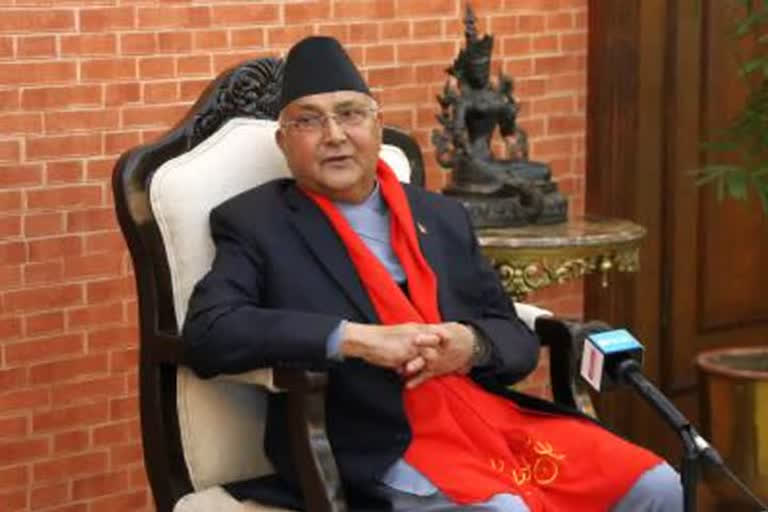Kathmandu: KP Sharma Oli was set to be reappointed as Nepal Prime Minister as the Opposition alliance of Nepali Congress and the Communist Party of Nepal (Maoist Centre) on Thursday failed to muster majority support to form the next government.
However, as the deadline which ended at 9:00 pm on Thursday, the NC-Maoist Centre alliance has its hopes crashing down as disgruntled Nepal-Khanal faction of the ruling CPN-UML did not forward their resignation, which they had been claiming to do for long as a bargaining chip with embattled former prime minister Oli.
As the time accorded by the President gradually runs out and the deadline approaches, it can well be assumed that Oli is all set to make a comeback, emerging victorious in this Game of Thrones, as the country grapples with an unprecedented rise in Covid-19 cases and corresponding fatalities as the second wave of the pandemic rages on, The Himalayan Times newspaper commented.
Read:| Nepal Prime Minister Oli loses vote of confidence in House of Representatives
Nepali Congress president Sher Bahadur Deuba and CPN-Maoist Centre chairman Pushpakamal Dahal "Prachanda" held a meeting on Thursday at the former's residence at Budhanilkantha in the outskirts of Kathmandu to discuss the formation of the new government.
Similarly, Prime Minister and chairman of ruling CPN-UML Oli and dissident leader of the party Madhav Kumar Nepal held a meeting in an attempt to make the last effort to patch up their differences.
After Prime Minister Oli withdrew action taken against four dissident leaders, including Madhav Nepal, for working against the party, 28 lawmakers close to the dissident leader withdrew their decision to resign en masse from the House of Representatives, which would pave way for Deuba to stake a claim for the prime minister's post.
Political observers familiar with the latest developments say the chances of Deuba claiming the prime ministership with the majority support by the Thursday night deadline is very dim.
Even if he submits the claim with the support of three political parties, Nepali Congress, CPN-Maoist Centre and Janata Samajwadi Party (JSP), its legality will be questioned as the Mahanta Thakur faction of the JSP is likely to oppose the move.
Although Prachanda has extended support to Deuba for the post of Prime Minister, he cannot claim the premiership without the support of the undivided JSP. A source close to JSP said that out of 32 lawmakers of the party, Thakur has command over 17.
Earlier, Baburam Bhattarai, a senior leader of JSP-N, said all parties needed to form a new national coalition government and hold elections in one year.
Bhattarai said such a government should not be led by a former prime minister or the current prime minister.
Read:| Nepal PM Oli to seek vote of confidence in Parliament on Monday
Bhattarai said such a government should be run based on a common minimum programme, should resolve the COVID crisis, and ensure economic relief packages, constitution amendment, and truth and reconciliation.
Given the parties' strengths and particularly the factional feuds in the CPN-UML and the Janata Samajbadi, many say the current numbers game is just a futile exercise and that the country, which has had eight different governments in a decade, would sooner or later head towards early polls, the Kathmandu Post reported.
After Oli lost the trust vote, the NC, the CPN -MC and the faction of the JSP led by Yadav urged President Bhandari to invoke Article 76 (2) of the Constitution to pave the way for the formation of a new government.
It says in cases where no party has a clear majority in the House, the President shall appoint as the prime minister a member of the House who can command the majority with the support of two or more parties in the lower house of Parliament.
If two or more political parties failed to give a majority Prime Minister by Thursday evening then the President will invite parties to submit the name of a minority Prime Minister from the largest party as per Article 76 sub-clause 3 of the Constitution.
In that case, Oli, whose party has 121 seats in Parliament, may again claim stake as the new prime minister. If Oli is appointed under the Constitution, he also needs to win the vote of confidence within 30 days from the date of the appointment.
Nepal plunged into a political crisis on December 20 last year after President Bhandari dissolved the House and announced fresh elections on April 30 and May 10 at the recommendation of Prime Minister Oli, amidst a tussle for power within the ruling Nepal Communist Party (NCP).
Read:| Nepal's Oli government slips in minority
Oli's move to dissolve the House sparked protests from a large section of the NCP led by his rival 'Prachanda'.
In February, the apex court reinstated the dissolved House, in a setback to Oli who was preparing for snap polls. Known for his pro-China stance, Oli had earlier served as the country's prime minister from October 11, 2015, to August 3, 2016, during which Kathmandu's ties with New Delhi had strained.
Nepal's COVID-19 cases reached 431,191 as 8,842 fresh cases were reported in the past 24 hours on Thursday. As many as 214 more deaths were also logged, taking the national toll to 4,466.
PTI



